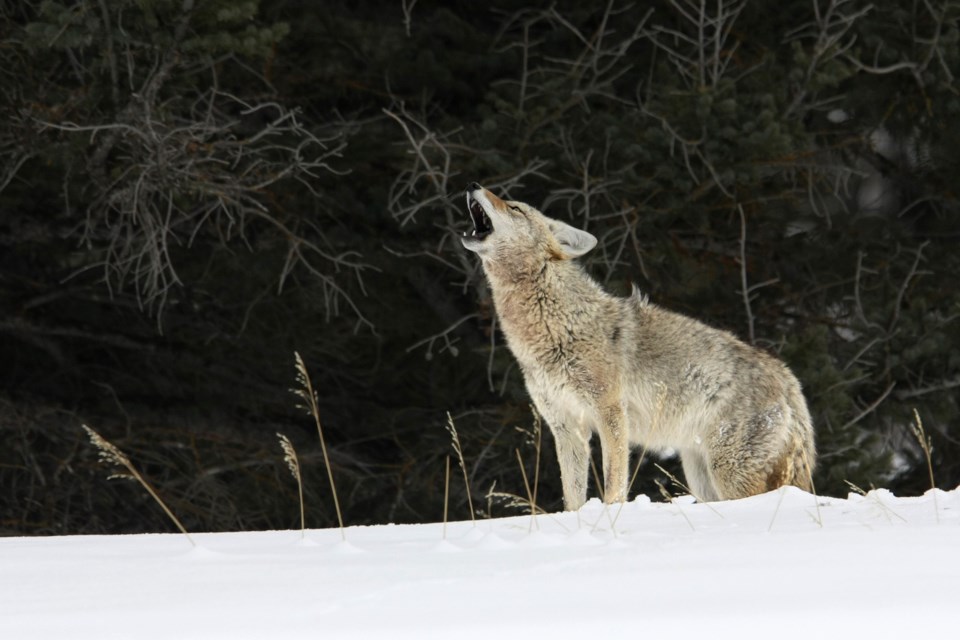EDITOR'S NOTE: This article originally appeared on Feb. 22.
Natalie Wroblowsky let her four-year-old dog, Mooch, outside last Tuesday around 3 p.m.
Thirty minutes later, she discovered Mooch the Jackapoo had been eaten by coyotes.
"It was definitely a coyote, because only his head and upper body just past his chest, his front paws... Everything below that was gone," Wroblowsy told FlamboroughToday.
Wroblowsky lives on the border between Greensville and West Flamborough, on a 150-acre lot backing onto a wooded area.
She said she's heard coyotes on her property in the past, but has a fenced in yard and an outdoor light for her three rescue dogs. Mooch, she said, was an outdoor dog and spent a lot of his time in the yard.
"If you bring him in, within a few minutes he's barking to go outside again," she said.

The coyote attack happened quickly and in the middle of the day. Wroblowsky said she isn't sure how she could have prevented it, but wants others in the area to be aware of what could happen.
According to Coyote Watch Canada, February is breeding season for coyotes and they are more active and visible. Hamilton Animal Services manager Kelly Beaton provided some tips on how to prevent a coyote attack.
Do not approach or feed coyotes
Coyotes are wild animals and can become more comfortable with humans as a result of regular contact, says Beaton. "There may be more contact between coyotes and humans if they are fed or otherwise encouraged to stay near residential areas."
Keep an eye on children, pets
In areas where there is known coyote activity, including wooded areas, ravines or new residential areas, it is important not to leave children, or pets unattended, Beaton stressed. "If you see a coyote exploring far from their natural habitat, call Hamilton Animal Services."
Don’t store food, garbage outside
Properly storing and maintaining garbage containers will prevent raccoons, skunks, cats, dogs and coyotes from becoming a nuisance, Beaton says. "It will discourage the presence of small rodents, which are an important food source for coyotes."
She also reminds people not to leave pet food outside; removing it will help prevent wildlife from being attracted to your property.
Finally, residents are advised to avoid composting meat products as the smell will attract animals to your property.
Keep your yard well lit
Beaton suggests using motion-sensitive lights in yards or gardens. "Well-lit yards or the use of motion-sensitive lighting will make a property less attractive for coyotes and other nocturnal wildlife," she says.
What to do if a coyote makes a den on your property
Animal Services should only be notified in the event the animal is sick/injured/in distress or deceased, says Beaton.
"Best practice for residents who have a den on their property is to ensure to keep children, pets and yourself away from the area," she says. "Do not leave out food or garbage bins, keep a safe distance and create loud noise to deter them. Coyotes can be especially aggressive when they are denning and when their babies are born. Coyotes tend to return to the same area each year to den."
What to do if a coyote approaches you
If a coyote approaches, the best strategy is to stay calm, make yourself appear larger, clap and shout, says Beaton. "Never run away."
If a coyote is presenting an immediate threat to public safety, residents should call Police or Hamilton Animal Services at 905-574-3433.
Wroblowsky hopes other families can prevent a similar attack to the one that claimed her little dog. She said she has received a huge amount of support from the Flamborough community, but that doesn't make losing Mooch any easier.
"The whole community has been really supportive, but it doesn't take away that this sweet little pup is gone."




